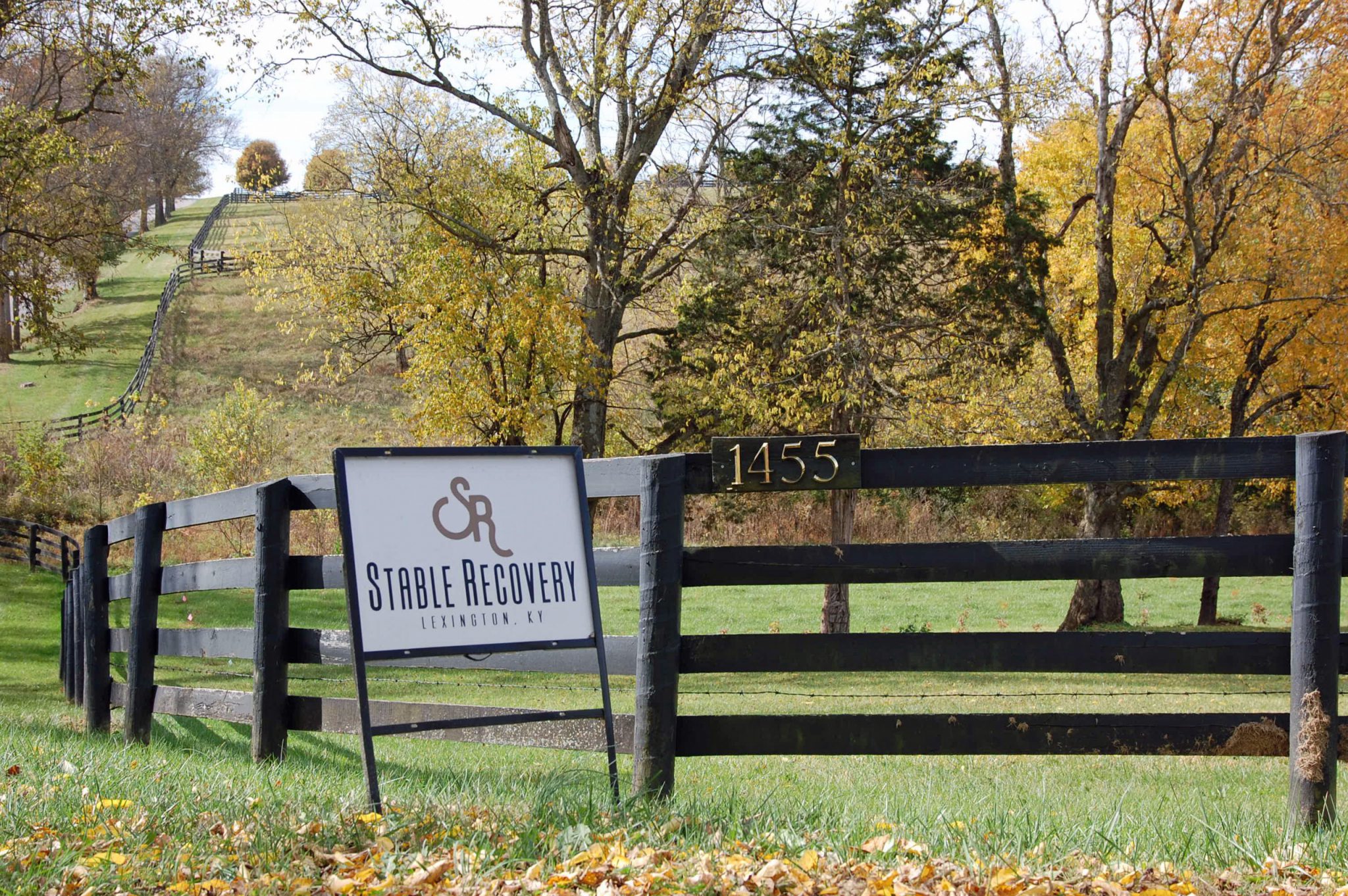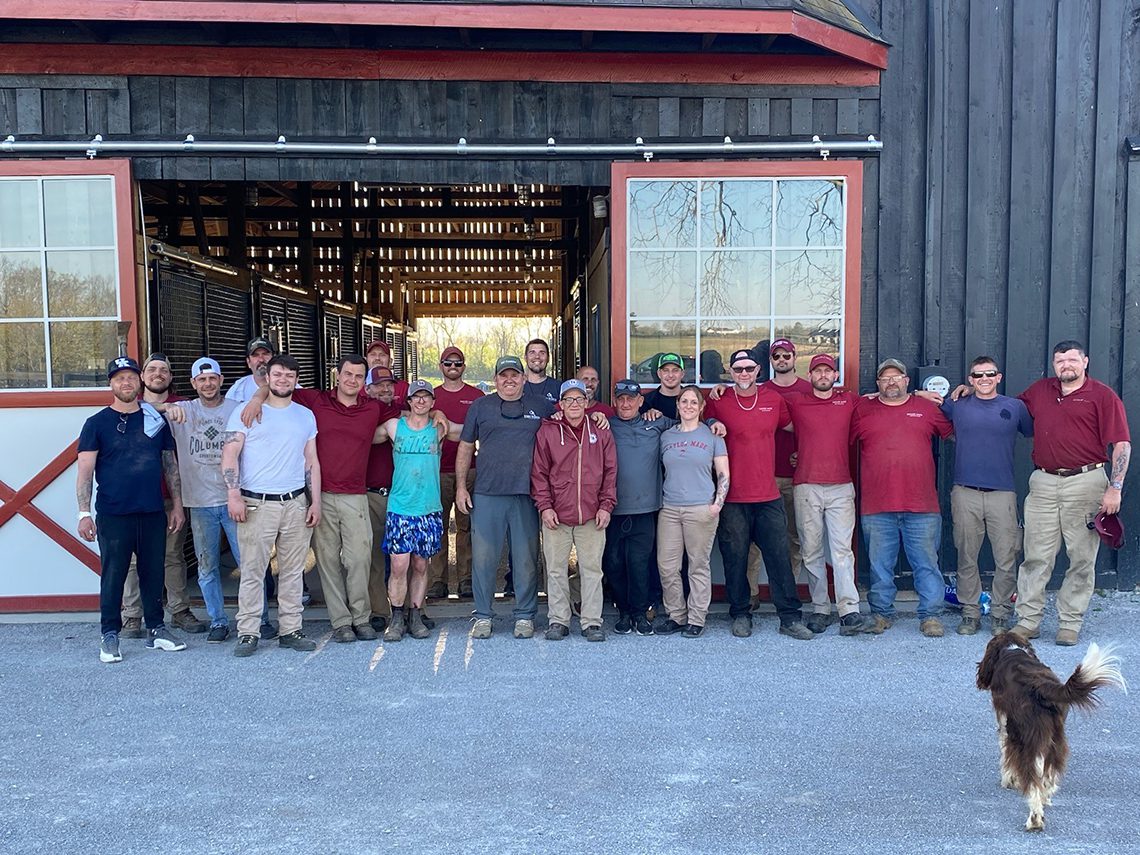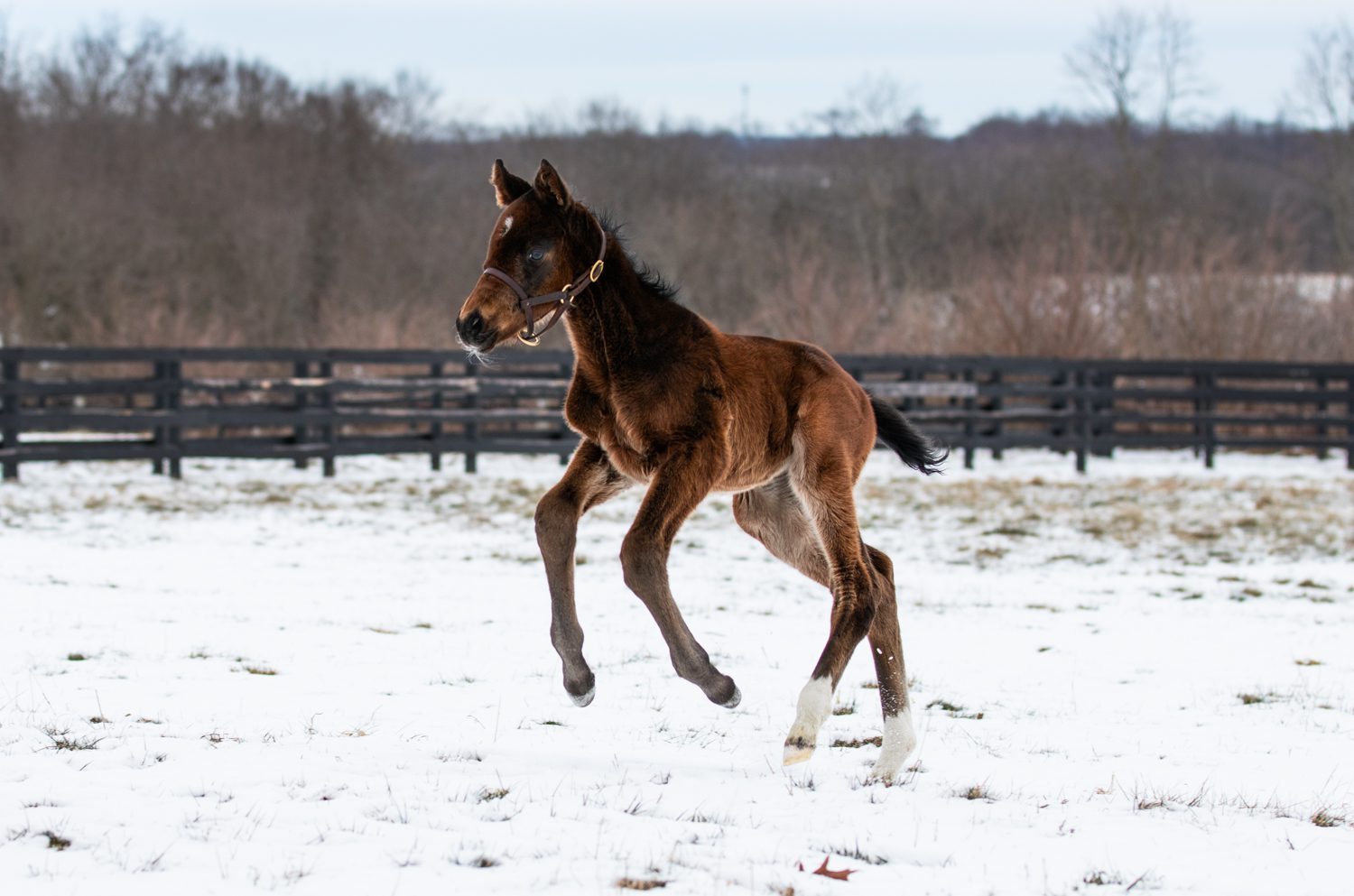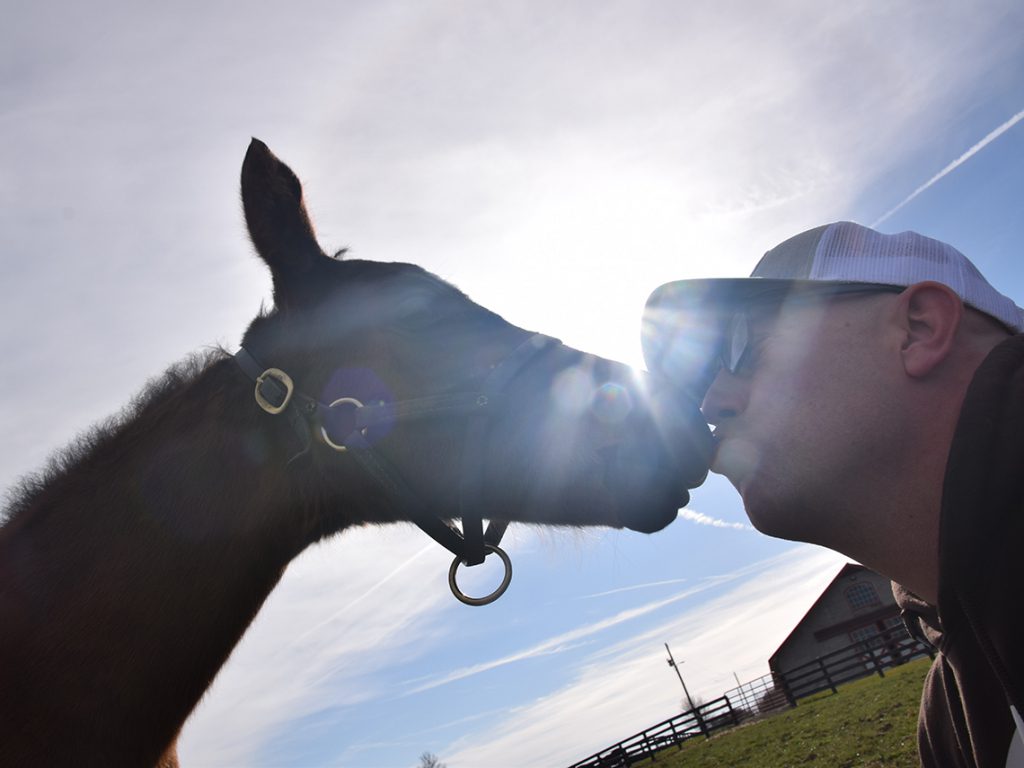Stable Recovery is a rehabilitation program in Lexington, Kentucky that provides a safe living environment and a peer-driven, therapeutic community for men in the early stages of recovery from drug and alcohol addiction. Along with going to 12-step meetings and support groups, residents attend the School of Horsemanship at Taylor Made Farm to learn a new vocation in the Thoroughbred industry. The School of Horsemanship is a project that was created by Frank Taylor two years ago and has since seen over a 100 men go through the program. Many of those graduates have gone on to pursue a career in an equine-related field. Spy Coast Farm, Rood & Riddle, WinStar Farm and Godolphin have recently partnered with Stable Recovery as the program looks to expand its reach throughout Lexington.
The TDN is launching a new series, 'The Road Back,' where once a month we will profile a graduate of the School of Horsemanship and Stable Recovery programs. First up is Mike Lowery, a divisional manager at Taylor Made Farm.
“My first day at Taylor Made, I was scared to death,” Mike Lowery admits with a grin. He's sitting on the back porch of the Stable Recovery house at Taylor Made during his lunch break. Behind him, grazing mares dot an autumn-hued pasture.
“I had never touched a horse or been to Keeneland until two and a half years ago when I started the School of Horsemanship,” he recounted. “A horse is a really large animal and you want me to be up close and personal with it? I was terrified. But there was one mare that day and I don't know what it was about her. I was going through some things in my early sobriety and it was something about the way that she looked at me. It was weird. I can't explain it. It was like she was telling me that everything was going to be alright and I just fell in love with the horse at that point.”

One home of the Stable Recovery program is in downtown Lexington and the other is at Taylor Made Farm | Katie Petrunyak
Lowery, age 33, has hardly gone a day without being around horses since. Now the divisional broodmare manager at Taylor Made, he is responsible for overseeing 200 horses–managing their daily care, foaling mares every spring and preparing them for the breeding shed, and teaching foals their first lessons on the ground.
“It's a big responsibility, but I'm pretty honored and blessed to have this position,” he said.
A few weeks ago, Nov. 4 marked three years of sobriety for Lowery. Living and working on the farm and leading over a dozen employees, he is worlds away from the hopeless place he had once found himself.
His story before he stepped foot on the path to where he is now?
“It's dark,” he warns, but gives a small smile as he settles back into his chair. He's told this story before.
“Really it started young. When I was 14 I started dabbling in alcohol and marijuana and then it progressively got worse from there. I grew up with a single mother, so I always felt a little different. It got really bad when I was about 21, but it didn't hit home until I was sleeping in the park a few years later in my hometown at Woodland Park. I had an 'aha' moment where I saw myself and I didn't like the way that I looked or the way I felt with the pain and misery that comes along with drug addiction.”
Lowery had tried to reclaim his life many times in the years leading up to when he finally hit rock bottom. He had been to 13 different treatment facilities for short stays, but fell back into addiction as soon as he got out. He always had reservations in the back of his mind that the treatment wouldn't work, that recovery “was kind of BS.” He didn't want to take time out of his life by committing to sitting around a circle at a recovery center for months on end.
“My family is from Lexington and it wasn't that they didn't love me, but they just couldn't see me in the condition that I was in,” he explained. “They kind of cut ties. My mom had me at a young age so I can't imagine what it felt like for her to see her oldest son in that condition. Nobody wanted to see me like that. I thought I was just affecting myself, but I was really affecting the people around me who loved me. My children, my mother. Other people suffered as well.”
When Lowery finally checked into a year-long treatment program, the scale read 147 pounds, which is 100 pounds less than his current healthy weight.
He was living at the Shepherd's House, a transitional residential drug addiction treatment center in Lexington, when he first heard about the School of Horsemanship.
“I heard that this guy Frank Taylor had this crazy idea of taking alcoholics and drug addicts and putting them into the work force because there is shortage of employees in the equine industry,” Lowery recalled.
Lowery was a member of the very first group to join the School of Horsemanship in 2021. He and his classmates were dubious at first, but as they gained new skills like picking feet, showing a horse and cleaning a stall, they found themselves looking forward to what they might learn the next day.
“We were pretty lost at the beginning, but a few guys took us under their wing and showed us the ropes,” Lowery said. “Nobody could really believe that it was working. I still can't believe it sometimes, but it is.”

The Stable Recovery team at Taylor Made | courtesy Stable Recovery
After three months, Lowery graduated from the program and joined Taylor Made as a full-time groom.
Another member of his graduating class was Will Walden, who came up with the idea of starting something similar to the School of Horsemanship on the racetrack. Frank Taylor supplied Walden's venture with its first group of yearlings and Lowery joined Walden and one other classmate in Ocala to help break the babies. Their three-man team–with Walden as trainer, Lowery as groom and Tyler Maxwell as exercise rider–launched their stable at Keeneland last spring and had their first winner at Churchill Downs on May 13.
The barn took off from there and Lowery traveled with Walden from Churchill Downs to Turfway Park to Ellis Park. It was especially at Ellis, three hours away from home, that he realized he didn't want to be working so far from his family. Lowery had several job opportunities back in Lexington, but he ultimately found his way back to Taylor Made. He returned to the farm as a barn foreman and soon stepped up to his current position as a divisional manager.
“I could go work at a factory or do construction or whatever, but it would be the same thing every day,” he explained. “Here, with the number of horses that Taylor Made has, it's always something new every day. I love that and it drives me. It keeps me going because as soon as I think that I know something, I get humbled really quick.”
On any given day, Lowery manages several people in the School of Horsemanship program. It's one of his favorite parts of his job.
“I don't forget where I came from,” he said. “I'm just like those guys. I'm in recovery as well. The only difference is that I've put in a little more time.”
There is something about the horse, he says, that has a significant impact on people going through recovery.
“The way I look at it, we have domesticated them so they depend on us for everything–feed, water, their feet,” he explained. “I really think it gives people in recovery a purpose. Especially in early recovery, if you don't have a purpose then really what are you doing?”
Lowery and his family live on the farm and his two children ages two and four have developed a fondness for their four-legged neighbors. To be able to provide his family with a home in an tranquil environment like the rolling acres of Taylor Made is an opportunity that he never really thought was possible.
“It's special,” he said. “I grew up without a father, so that was something that I never wanted to put my children through but because of the drug addiction I ended up doing that to them. Now I can provide a beautiful home for them and they love the horses here. It means a lot to me.”
Stable Recovery, and its partner the School of Horsemanship, is looking to expand throughout Lexington. Rood & Riddle, Spy Coast Farm, Godolphin and WinStar Farm have already joined the project and there is a current wait list plenty long enough for more partners to join.
Lowery said he knows it might be a big ask for employers, but he can personally attest to the impact it could make.
“Not everybody that comes through here is going to make it or is going to stay sober, so you do have that,” he admits. “But for the most part, the percentage of success is high. You're getting good quality employees that can pass a drug test and will show up every day for work. To me that's all you can ask for. And you're helping people. My life is completely different than what it looked like a few years ago. Back then I wouldn't have known anybody crazy enough to hire guys like me, knowing my previous history. They gave me an opportunity when really nobody else would have, so for that I'm forever grateful.”

The post The Road Back: Once Homeless, Mike Lowery Found Purpose at Taylor Made appeared first on TDN | Thoroughbred Daily News | Horse Racing News, Results and Video | Thoroughbred Breeding and Auctions.
Source of original post




